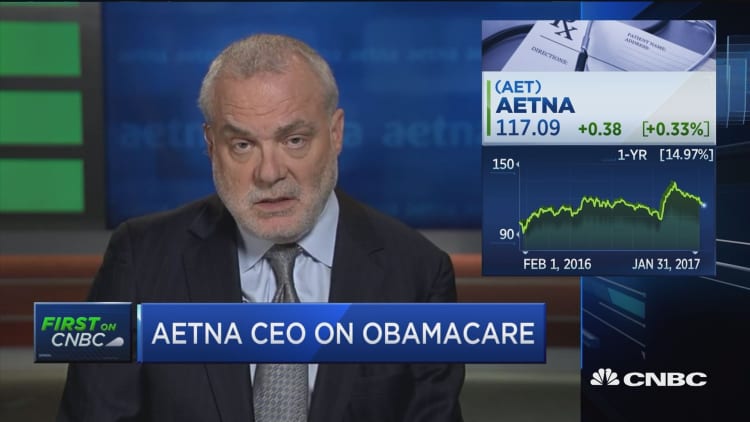
The water's still not great in those Obamacare "risk pools," Aetna's CEO says.
Aetna's Chief Mark Bertolini said Tuesday that the big health insurer sees further "deterioration" in the financial risk of covering the pool of Obamacare customers — increasing pressure on insurers in the few states where Aetna continues selling individual health plans, as well as in other states the company exited this year.
But Bertolini also said that the company expects 2018 "probably will be business as usual," when asked how Aetna was dealing with Republican plans to repeal the Affordable Care Act and replace it with other legislation.
Bertolini suggested that Congress will not repeal Obamacare effective this year or next, but would instead stay any repeal until at least 2019, given insurers' need to file their plans' rates by spring in advance of the next calendar year.
"The nearest time we could have completely new program is 1/1/2019, so '18 would be a transition year, and we will look at it like that," Bertolini said on CNBC's "Squawk Alley."
"On April 1, we will need to file rates for '18," he said. "And our assumption is that the plans will look the same as they do for '17. And we won't expect any changes until 2019."
Bertolini also disputed criticism by the U.S. Justice Department and a federal judge that Aetna had exited a slew of Obamacare markets this year to increase its leverage to win approval for a proposed $37 billion merger with Humana.
And he said Aetna is now "doing all the homework necessary" to decide whether to renew efforts to make the merger happen on the heels of a decision last week that blocked the deal on the grounds that the merged company would have reduced competition.
"We have until February 15 to make this decision," Bertolini said, noting the date the merger agreement ends. "One of the things that we need to consider... is what are the various options we could pursue to get this combination done." He said the merger would give a "better product" to customers in both the Medicare and Medicaid markets, "more affordable, and simpler."
"We're disappointed where we are now," he said, referring to the merger being blocked. "But, you know, until Feb. 15 we really don't need to make that call."
Bertolini scoffed at an idea repeatedly floated by President Donald Trump and some congressional Republicans that a replacement for Obamacare include authorization of health insurers to sell their plans across state lines.
Bertolini called that "a dated concept ... probably time-worn and something that we should not really consider." He noted that "insurance products now are tightly aligned with" networks of doctors, hospitals and other health providers, "and so buying an insurance product from another state that's tied to a network in another state really doesn't work well for people seeking care."
Aetna this year exited 11 out of the 15 states where the company had sold individual insurance plans on ACA exchanges. Aetna cited losses from that business since exchange-sold plans began coverage in 2014, and fears that the pool of customers would continue to contain too many sick people and too few healthy ones.
Bertolini said that risk remains for Aetna in the four states where it continues to sell ACA plans, and in the states where it left.
"The biggest risk for us is that in the ACA we lost $450 million last year, $100 million more than we expected," Bertolini said when asked about earnings in 2017. "The risk pools continue to deteriorate and we are still in a number of exchanges, with 240,000 members, of which half are still new."
"So the risk associated with that population, as the risk pools changes," and the elimination of Obamacare programs designed to mitigate insurers' financial downside, "create some headwinds for us in '17," Bertolini said.
Bertolini mentioned that deterioration of the risk pools in Aetna's remaining ACA markets again when he was asked about criticism by U.S. District Judge John Bates.
In his decision last week blocking the merger with Humana, Bates said Aetna had threatened to leave a number of states as it "tried to leverage its participation in the exchange for favorable treatment from [regulators] regarding the proposed merger."
Bates also said that Aetna had left 17 counties where it was competing with Humana "at least in part for the purpose of improving its litigation position" against the Justice Department, which sued to block the merger.
Bertolini on Tuesday said, "The Department of Justice and the courts look at things by county. As a business, we operate by state, we can't have an office in every county."
"So the analysis of 17 counties that were part of the complaint is really an interesting analysis ... in the halls of justice," Bertolini said. "But in our business, we have to operate by state, and we made our decisions by state. We made our decisions based on forward-looking earnings for 2017, because we had to file our rates for '17 in April of 2016, and we are seeing a deterioration of those markets, as we expected, which would have created greater risk for us in 2017."
Bertolini was asked about Trump's meeting earlier Tuesday with the CEOs of a number of leading pharmaceutical companies. At that meeting, Trump repeatedly stressed the need to lower drug prices — a message that will resonate with insurers, who for years have complained about the costs of prescription medications.
"Costs in drugs are the fastest rising cost that we see across the spectrum," Bertolini said. "In drugs, we are seeing double-digit increases year over year, largely driven by specialty drugs. We have to find a solution to make these programs more affordable."
"If in fact we're looking for a way to make [insurance plan] premiums more affordable, we have to address drug costs sooner rather than later," Bertolini said.


